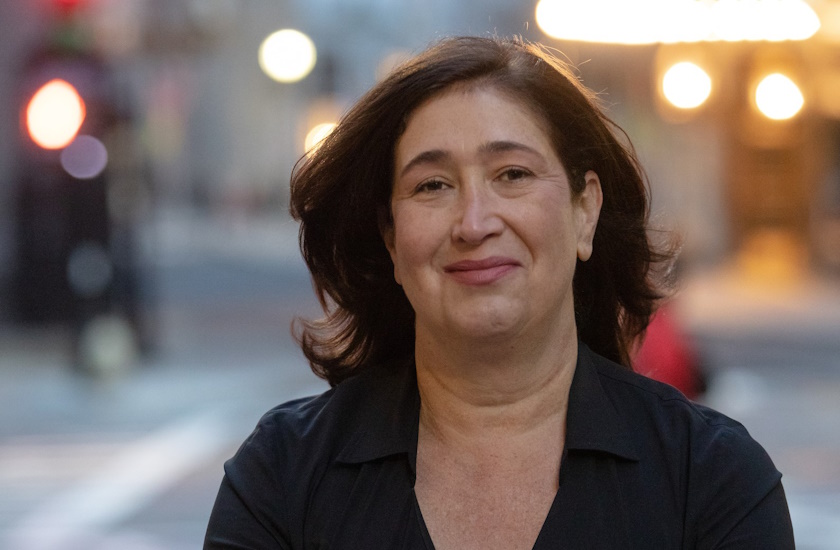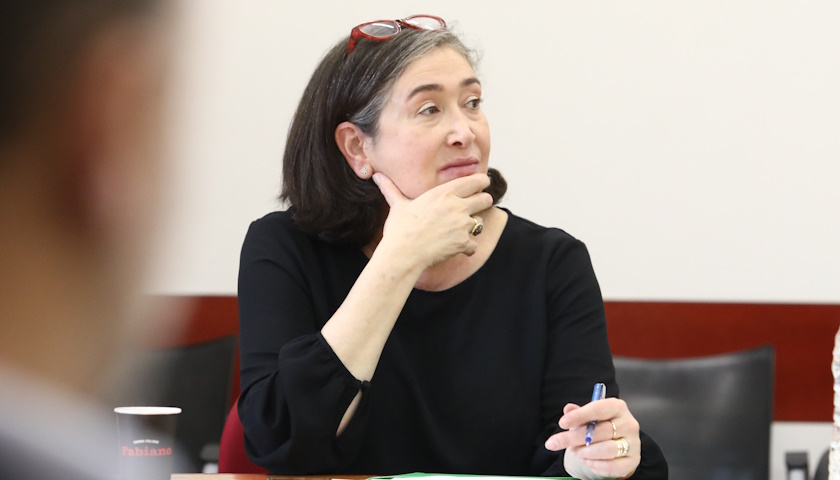To Find a Way Forward, Look First to the Past
Professor Michal Ben-Josef Hirsch explains how acknowledging history could ‘enlarge the bargaining space’ in Israel/Palestine

Suffolk University Political Science & Legal Studies Professor Michal Ben-Josef Hirsch recently traveled to Israel for the inaugural conference on Negotiations in Transformative Justice at the Center for the Study of Conflicts and Their Resolution at Tel Aviv University. Returning to her alma mater for the first time, Ben-Josef Hirsch shared insights from her research on global human rights norms, international relations, and how societies move forward after conflict by acknowledging historical harms—and how that work relates to current conflicts.
You are originally from Israel and you teach a course at Suffolk called The Conflict in Israel/Palestine. Have you always focused on the region in your research and teaching?
For the first 10 years of my career, I actually did not. I studied international relations theory and the role of international norms. I put my interest in Israel/Palestine to the side and tried not to make it the focus of my research agenda.
When I began teaching a course about Israel/Palestine, I wanted to approach it in a balanced way, by bringing in both Israeli and Palestinian voices and using texts that presented diverging narratives about key historical events and developments. It really was from teaching that I came back to Israel/Palestine as part of my research. And the idea for my recent policy paper—“Historical Acknowledgment as an Early Conflict Negotiation Strategy: A Feasibility Study of Israel/Palestine,” which I discussed at the conference in Tel Aviv—certainly came from my work on transitional justice around the world, understanding that the practices of transitional justice are not being utilized in the Israeli/Palestinian context.
What are some of those ideas and practical measures that other societies have taken?
The concept of transitional justice—which grew up after the end of the Cold War, in the democratization wave of the ’90s—means that when there is a history or legacy of human rights violations or historical injustices, addressing them and acknowledging those events helps nations move forward. It has been highlighted as important for democratization, conflict resolution, reconciliation, and even for security.
In my research, I’ve looked at the role of truth commissions in post-apartheid South Africa, and studied how societies moved on from conflict in places like Northern Ireland, Rwanda, and Sierra Leone. Other mechanisms for transitional justice can include trials, memorialization, reparations, and revisions of history textbooks. The research tells us that dealing with the past is a desirable and advisable practice for many reasons. The same way that individual people dealing with trauma can find it therapeutic to have their trauma acknowledged, groups of people might collectively need that historical acknowledgement to heal. Moreover, contested or unacknowledged history can be a cause of conflict.
What happens when history goes unresolved?
Often, opposing sides don’t fight solely about the current conflict. A very concrete example now is Israel/Palestine. Whether settler colonialism is the right framework to define the establishment of a Zionist state in Palestine is a contested historical question. And it’s very much part of the cause of the conflict because it’s a mobilizing thing for the conflict on both sides. Of course, we have a lot of scholarship which shows that people don't fight or die just because of history. But history is definitely part of what they fight and die for.

How can your work in the area of transitional justice offer help now?
The study of transitional justice is mostly associated with post-conflict peace building. So after the transition, or after the end of the conflict, when should we apologize? Who should apologize? How can we raise a future generation that will come to see each other as humans and live together? But that can take generations. What if we challenge this assumption? Let's see what doing historical acknowledgement in the short term, early in the negotiation process can do.
What would that look like in practice?
Using elements of historical acknowledgement during the negotiation process offers two main benefits. First, it enlarges the bargaining space. It adds one more thing we can negotiate. When you negotiate only tangible trade-offs, it is negotiations over territories, over security arrangements, over water issues, things like that. Now we’re also introducing nontangible or somewhat tangible things: reparations, a formal apology, changing the history books.
Secondly, it introduces a new way to signal in the negotiations. When we go into negotiation, usually the participants are enemies. So the level of trust is very low. Historical acknowledgements address values and identity and can signal good faith to the other party. So, for example, if you’re willing to change your history books in a way that acknowledges historical harm, and your kids will learn that version from now on in school, you’re signaling that you have a long-term commitment for future change.
Has this approach been tried before during negotiations?
Somewhat, and with success. It works because it introduces new trade-offs. In negotiating the end of apartheid in South Africa in the mid-1990s the two sides were deadlocked on many issues, and especially on the issue of trials. The introduction of the idea of a truth and reconciliation commission was offered as a concession and facilitated a compromise in the negotiations. That’s what I mean by the importance of enlarging the bargaining space.
Do you believe this approach could work in Israel/Palestine?
I honestly think that without some elements of historical acknowledgement and mutual recognition, it will be hard to move forward in any negotiations. Of course there are critical tangible things to negotiate that are not going to be resolved merely by historical acknowledgement. I want to highlight that historical justice doesn’t come instead of all those aspects such as sovereignty, security, refugees, that will have to be addressed. But this approach offers a different way of thinking that can facilitate better negotiations. I really think it’s a necessary condition for negotiation at this point.
Contact
Greg Gatlin
Office of Public Affairs
617-573-8428
Andrea Grant
Office of Public Affairs
617-573-8410



